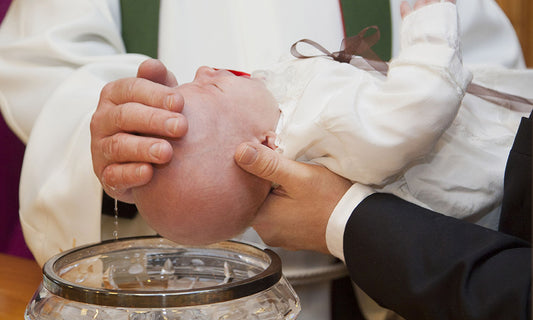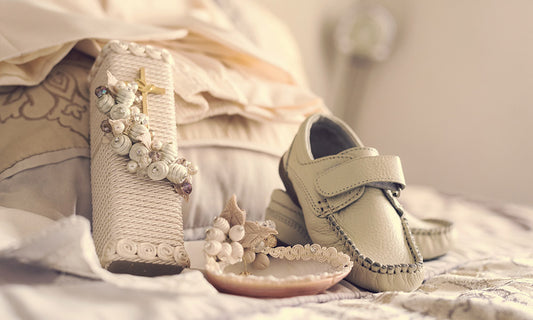
Infant Baptism
Baptism is the introduction of a person into the Church community. Through the waters of Baptism the person enters into the life of God - Father, Son and Spirit. He or she is dedicated to God and all that is good.
If you want to have your baby baptised, the first step is to go and see your parish priest or the pastoral associate. It's best to telephone to make an appointment first rather than try and catch the priest at the end of Mass.
You may be asked to come along and talk about the meaning of baptism and what it is you are asking of the Church.
Parishes vary as to what they expect of parents bringing a child for Baptism. It is good to see any preparation for Baptism as an opportunity for you to understand more about what you are asking for your child rather than as a task to be fulfilled.
If you are a regular member of your local parish, Baptism is a wonderful opportunity for your fellow parishioners to share your joy in your new baby. That is why Baptism is often celebrated during Sunday mass so that as many people as possible can welcome your child into the community.
Godparents
It is good if the godparents can be adult Catholics who will take an interest in your baby as he or she grows up. In the early Church the godparents were sponsors who taught the new Christian, usually an adult, about the faith.
Later on when infant baptism became usual, the godparents often took the role of guardians of the child if anything happened to the parents. Something of these two roles remain today. Choose godparents who are likely to be around and have an interest in your child over the years.
What is the role of the sponsor at Baptism?
The role of the godparent or sponsor at the baptism of a child is to join with the parents in presenting the child and to be a help and support to the child in growing in faith and living the Christian life.The question that is asked of godparents explains this: 'Are you willing to help the parents of this child in their duty as Christian parents?' They stand with the parents and proclaim their faith on behalf of the child. Only one godparent is required but there may be two. In some cultures it is a common and legitimate custom to allow a greater number. Usually in Australia there are two.
It follows from this that the godparent ought also to live out those same Christian values and way of life that the ceremony implies. For this reason the Church requires that the godparent be a confirmed Catholic who has received the Eucharist and lives out the life of faith required by the role.
Must both godparents be Catholic?
One godparent must be a Catholic who has been confirmed and has received the Eucharist, and who lives a life worthy of the role that he or she is about to undertake. It is possible to have just the one godparent. Alternatively, an Eastern Orthodox Christian may be a godparent (along with the Catholic godparent). Apart from this situation, as long as one godparent is Catholic, it is permissible for a non-Catholic to act as witness to your child's baptism. It is not possible for an unbaptised person to act as godparent or witness. Does the Catholic Church place any restrictions on who may be a godparent at Baptism?
There must be at least one person who is a Catholic who has been confirmed and has received the Eucharist, who is at least sixteen years old. The minister of Baptism may decide that there is a just reason why a person who is not yet 16 may be godparent. As long as one godparent is Catholic, it is permissible for a non-Catholic to act as witness to a child's baptism. Does a child whose parents are not married have the right to be baptised in the Catholic Church?
All that the Church requires is that the parents undertake to do their best to bring the child up as Catholic. Provided that there is a well-founded hope that the child will be brought up as Catholic, the child may be baptised. Does their not being married affect their willingness or ability to give a child a catholic upbringing? During the preparation for baptism the parents might be asked to consider this. Nothing is said on the baptismal certificate about the status of the parents. Sometimes a confidential note is made in the parish baptismal register. What role do I, a non-Catholic parent, have in the baptismal ceremony?
Several questions are asked of you during the ceremony:- What name have you given your child?
- What so you ask of God's church for N.?
The priest then says: 'You have asked to have your child baptised. In doing so you are accepting responsibility for bringing him up in the practice of the faith. It will be your duty to bring him up to follow Christ's teaching, by loving God and our neighbour. Do you clearly understand what you are undertaking?
You are invited to profess your faith. Sometimes, you do this with the whole community.
Following this, and immediately prior to the baptism of your child the priest asks you: "Is it your will that your child should be baptised in the faith of the Church, which we have all professed with you?"
You are invited to participate in the ceremony in other ways such as:-
- Either one of you holds the child.
- You are invited to trace the sign of the cross on the child's forehead.
- Either you or godparent puts a white garment on your child as a sign of being clothed with Christ and as a sign of Christian dignity.
- Either you or godparent lights your child's baptismal candle from the Paschal Candle.
- At the end of the ceremony the celebrant blesses individually the mother and the father of the child.
As a non-Catholic parent you may choose the extent to which you are involved. Some of the questions you might choose to respond to, others you might choose to remain silent and have your spouse answer. You can discuss this with the celebrant during the preparation for the baptism.
Why do we have several babies baptised at the one ceremony?
In receiving baptism your child becomes a member of the Church. Therefore, the presence of the believing community represents the action of baptism. The gathered community is a sign of the Church who welcomes your child. In fact, the celebrant says to your child, calling him or her by name, 'The Christian community welcomes you with great joy. In its name I claim you for Christ our saviour by the sign of his cross.' If possible baptism should be celebrated during the Sunday Eucharist when the community are gathered together to celebrate the Lord's Day. If it is not possible to have the celebration during the Sunday Eucharist, the gathering of the community of the parents and families of the babies to be baptised are present as the community of the Church.
This material was prepared by Elizabeth Delaney sgs, Information Officer, Australian Catholic Bishops Conference with thanks to Catholic Ireland for the use of their content.


